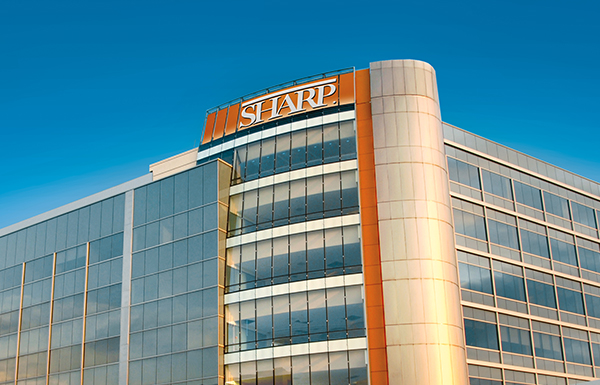

Chris Walker envisioned minimally invasive surgeries, particularly robotic assisted, as the cornerstone of his hospital’s growth. As Sharp Coronado Hospital’s chief operating officer, Walker introduced a general surgery robotic-assisted unit, attracting surgeons and increasing surgeries.
When Walker later started work at Sharp Memorial Hospital as vice president of clinical services in 2019, he discovered some surgeons were unhappy. They were trained in robotics but didn’t have access to enough surgical units. It was a classic case of demand outweighing supply. The hospital added a couple of da Vinci platforms, but that wasn’t sufficient.
Sharp had previously discussed flexible acquisition finance models with Intuitive. Sharp’s decision-makers at the time considered additional robotic surgical devices a capital expense that their budgets wouldn’t allow. “We had so much tradition, which is great, but sometimes, tradition is a barrier,” said Walker.
Soon after those initial finance discussions stalled, Tony Guerra transitioned into a new role as Sharp Memorial’s chief financial officer.
Sharp’s operations, finance, and clinical leaders met to revisit the opportunities for expanding their minimally invasive robotic-assisted capabilities. They asked, “How can we make robotic surgery a positive financial and quality proposition?”
To better understand the current quality and financial impact from their robotics program, the Sharp team looked across a variety of factors - intensive care unit days, blood transfusions, surgical complications, return to surgery, and inpatient length of stay, alongside outpatient surgery outcomes like conversions to open and opioid use - where Sharp discovered many advantages they were realizing with robotics.
“[From there], we began a reevaluation of Intuitive’s financing options and had an ‘aha’ moment,” Guerra said. Sharp’s accounting team confirmed that they could report Intuitive’s financing lease as operating, not capital, expenses. The hospital quickly sought to expand its robotics capacity based on these findings.
Sharp uses a hybrid model to finance its robotic-assisted surgical capabilities. “I don't think there's any one acquisition model that's the same for any organization. It has to align with your strategy, your physicians, your operational capacity, and sometimes just how much money is in your bucket,” Walker said. “I own over half of my assets. Sometimes I choose to do a flexible acquisition because I'm not going to be able to have that asset on site in the time that I can get the money lined up.”

Sharp and Intuitive collaborate closely to optimize value for the hospital. “I think they've done a really good job to be more than a vendor, and I think they are a unique player in the hospital world of OR technical support,” Walker said of Intuitive.
Sharp discovered that surgical volume builds expertise, and expertise draws more volume. The hospital started recruiting more robotics-trained physicians.
One of Sharp’s initiatives is using robotic-assisted surgery around the clock for a wide range of surgical types, including emergency care. “We pretty much have full, unfettered access on our campus for any appropriate case type. We would not have been able to do that without this acquisition model,” Walker said. Another robotics initiative addresses highly complex cases including coronary bypass and mitral valve repairs. “I don't even have to prove to people anymore that the value proposition exists.”
Sharp has substantial capitated business, over 30%. According to Guerra, evaluating the total episodic cost of patient care and not just operating room cost per case is imperative, through robotic-assisted surgical expansion, Sharp has seen a reduction in their overall cost of care.
Guerra also said that lower surgical complication rates may create other economic advantages even in a predominantly fee-for-service environment. This is especially important as value-based payment models grow.
Sharp Memorial now has 13 fourth-generation platforms and ensures surgeons have access as needed by arranging workflow to maximize the use of the technology. “Hospitals will continue to further find cost saving initiatives as reimbursements further decline. We will need to change the way we have traditionally designed and equipped OR rooms. We are using lap towers less and less but seem to have that technology in all rooms. I see big opportunities to eliminate traditional laparoscopic towers as base equipment and replace with robotic systems. Our data already shows that I should have more robotic systems than lap by three-fold, but I still have three-fold more lap towers. I see that change quickly over the next 3-5 years as equipment reaches their technological lifespan,” shared Walker.
Walker estimates Sharp will perform almost 5,000 robotic surgeries by the end of 2022. Yet, he said, technology doesn’t stand alone. “We aligned philosophically about what's best for patients at the beginning of change management. I think that was critical,” Walker said.
“If you don’t have an aligned structure, process, process improvement, and people, you don’t have a program,” he added. “Strategic alignment between the care teams and the C-suite set the tone for what we needed to do operationally.”
Walker said the strong alignment between Sharp and Intuitive is integral to their program’s success. “We follow a common model that Intuitive uses to educate programs. More value comes with that relationship than just a capital piece of equipment,” he said. “It comes with education, resources, and training. It comes with strategy.”
These strategic alignments and optimized robotic-surgery access enabled Sharp to build a strong minimally invasive care program. They continue exploring new ways to refine their program, creating even more synergy and create better outcomes. This includes learning from others, collaborating with other hospital leaders on new ways to drive program excellence, and sharing lessons from their own journey.
If Sharp’s journey is one you also want to take, you can find out more — through a one-on-one discussion with Chris Walker and Tony Guerra.
Complete the form below, and an Intuitive representative will be in touch to answer your initial questions. We’ll then arrange a conversation between your team and Sharp’s executives.
We want you to feel free to ask questions and explore how our flexible acquisition options might best work for your hospital. Complete the form to have your questions answered and get connected with Sharp Memorial Hospital’s executives.
Thank you for your submission.
Important safety information
Serious complications may occur in any surgery, including surgery with a da Vinci system, up to and including death. Examples of serious or life-threatening complications, which may require prolonged and/or unexpected hospitalization and/or reoperation, include but are not limited to, one or more of the following: injury to tissues/organs, bleeding, infection, and internal scarring that can cause long-lasting dysfunction/pain.
Risks specific to minimally invasive surgery, including surgery with a da Vinci system, include but are not limited to, one or more of the following: temporary pain/nerve injury associated with positioning; a longer operative time, the need to convert to an open approach, or the need for additional or larger incision sites. Converting the procedure could result in a longer operative time, a longer time under anesthesia, and could lead to increased complications.
Contraindications applicable to the use of conventional endoscopic instruments also apply to the use of all da Vinci instruments.
For important safety information, including surgical risks and considerations, please also refer to www.intuitive.com/safety. For a product’s intended use and/or indications for use, risks, full cautions and warnings, please refer to the associated User Manual(s).
Individual outcomes may depend on a number of factors, including but not limited to patient characteristics, disease characteristics, and/or surgeon experience.
Da Vinci Xi/X system precaution statement
The demonstration of safety and effectiveness for the representative specific procedures did not include evaluation of outcomes related to the treatment of cancer (overall survival, disease-free survival, local recurrence) or treatment of the patient’s underlying disease/condition. Device usage in all surgical procedures should be guided by the clinical judgment of an adequately trained surgeon.